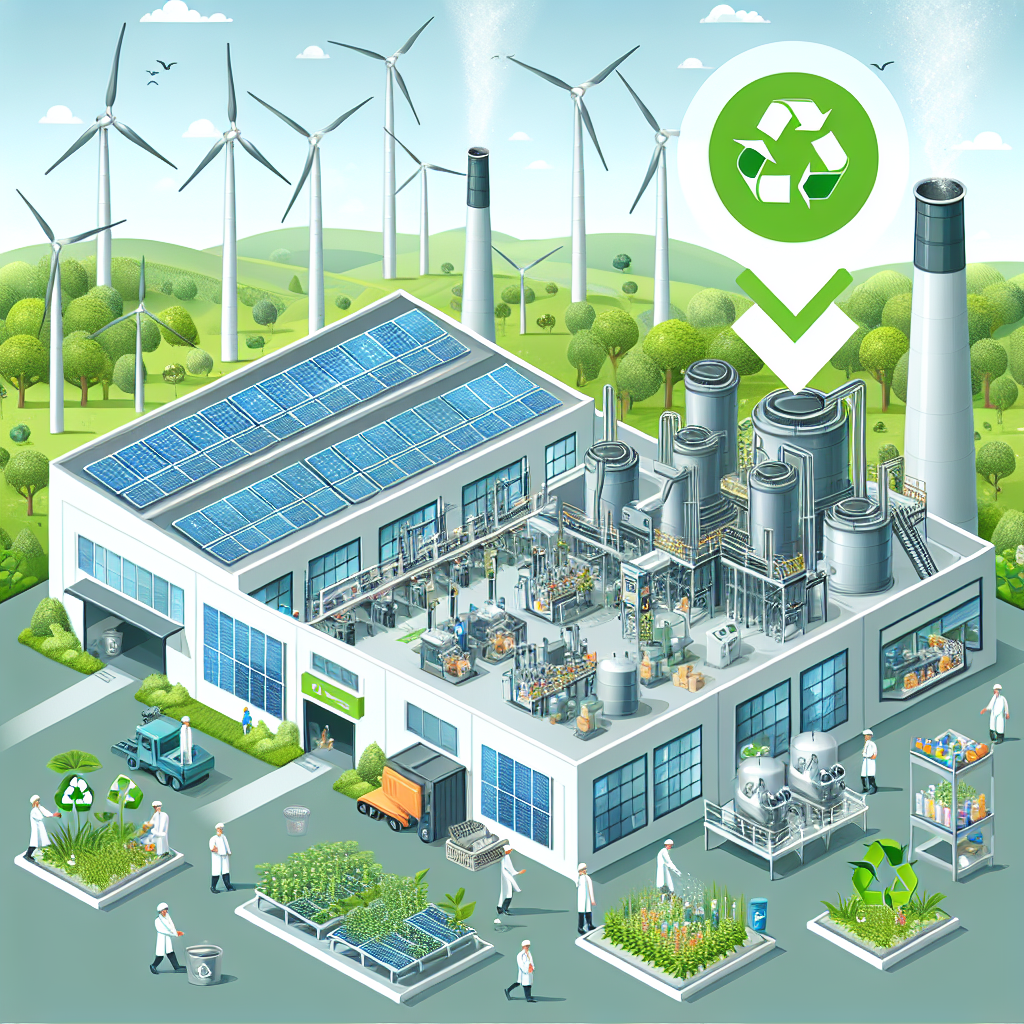How to ensure the sustainability of supplement manufacturing operations
-
Table of Contents
- Sustainable Supplement Manufacturing: Strategies for Eco-Friendly Operations
- Understanding the Importance of Sustainability in Supplement Manufacturing
- Assessing the Environmental Impact
- Implementing Eco-Friendly Manufacturing Processes
- Sourcing Sustainable Raw Materials
- Adopting a Circular Economy Model
- Engaging in Corporate Social Responsibility
- Embracing Transparency and Consumer Education
- Investing in Research and Development
- Conclusion: The Path to Sustainable Supplement Manufacturing
- Discover ETprotein’s Sustainable Protein Products
Sustainable Supplement Manufacturing: Strategies for Eco-Friendly Operations

The supplement industry has seen a significant rise in demand over the past few years, with the global dietary supplements market size valued at USD 140.3 billion in 2020 and expected to expand at a compound annual growth rate (CAGR) of 8.6% from 2021 to 2028. As the industry grows, so does the responsibility to ensure that manufacturing practices are sustainable and environmentally friendly. This article explores the various strategies supplement manufacturers can implement to promote sustainability in their operations.
Understanding the Importance of Sustainability in Supplement Manufacturing
Sustainability in supplement manufacturing is not just about reducing environmental impact; it’s also about ensuring long-term economic viability and social responsibility. Sustainable practices can lead to cost savings, improved brand reputation, and compliance with increasingly stringent environmental regulations.
Assessing the Environmental Impact
The first step towards sustainability is understanding and assessing the environmental footprint of manufacturing operations. This includes evaluating energy consumption, water usage, waste generation, and the sourcing of raw materials.
Implementing Eco-Friendly Manufacturing Processes
Once the environmental impact is assessed, manufacturers can implement several strategies to minimize their footprint:
- Energy Efficiency: Upgrading to energy-efficient machinery and lighting, using renewable energy sources, and optimizing production processes to reduce energy consumption.
- Water Conservation: Implementing water-saving technologies and recycling wastewater can significantly reduce water usage.
- Waste Management: Reducing waste through better inventory management, recycling programs, and by-products utilization.
- Sustainable Packaging: Using recyclable or biodegradable packaging materials and minimizing packaging waste.
Sourcing Sustainable Raw Materials
Choosing sustainable sources for raw materials is crucial for the supplement industry. This involves:
- Partnering with suppliers who practice sustainable farming and harvesting.
- Using certified organic and non-GMO ingredients.
- Ensuring fair trade and ethical labor practices in the supply chain.
Adopting a Circular Economy Model
A circular economy model focuses on reusing materials and creating a closed-loop system to minimize waste. In supplement manufacturing, this can mean:
- Designing products for a longer lifecycle.
- Facilitating product recycling or composting at the end of their life.
- Recovering valuable materials from waste streams.
Engaging in Corporate Social Responsibility
Corporate social responsibility (CSR) initiatives can enhance a company’s sustainability efforts. This includes:
- Investing in community development projects.
- Supporting health and wellness programs.
- Reducing carbon footprint through offset programs.
Embracing Transparency and Consumer Education
Consumers are increasingly interested in the sustainability of the products they purchase. Supplement manufacturers can foster trust by:
- Providing transparent information about sourcing and manufacturing practices.
- Educating consumers on the benefits of sustainable products.
- Labeling products with sustainability certifications.
Investing in Research and Development
Continuous innovation is key to advancing sustainability. Investment in R&D can lead to:
- New eco-friendly materials and formulations.
- Improved manufacturing processes that reduce environmental impact.
- Development of products that contribute to a sustainable lifestyle.
Conclusion: The Path to Sustainable Supplement Manufacturing
Ensuring the sustainability of supplement manufacturing operations is a multifaceted endeavor that requires commitment and innovation. By assessing environmental impact, implementing eco-friendly processes, sourcing sustainable raw materials, adopting a circular economy model, engaging in CSR, embracing transparency, and investing in R&D, supplement manufacturers can significantly reduce their environmental footprint while meeting consumer demand for sustainable products. The key takeaways for manufacturers are to prioritize sustainability in every aspect of their operations and to view it as an ongoing process rather than a one-time goal.
Discover ETprotein’s Sustainable Protein Products
If you’re looking for sustainable protein options, ETprotein offers a range of organic bulk vegan proteins that are non-GMO and allergen-free. Their products, including Organic rice protein, pea protein, and various seed proteins, are produced with a commitment to sustainability and quality. ETprotein’s L-(+)-Ergothioneine (EGT) products are available in various grades suitable for the nutraceutical, pharmaceutical, and cosmeceutical industries. To learn more about their offerings and how they can meet your protein needs, contact ETprotein today.
About ETprotein:
ETprotein, a reputable protein and L-(+)-Ergothioneine (EGT) Chinese factory manufacturer and supplier, is renowned for producing, stocking, exporting, and delivering the highest quality organic bulk vegan proteins and L-(+)-Ergothioneine. They include Organic rice protein, clear rice protein, pea protein, clear pea protein, watermelon seed protein, pumpkin seed protein, sunflower seed protein, mung bean protein, peanut protein, and L-(+)-Ergothioneine EGT Pharmaceutical grade, L-(+)-Ergothioneine EGT food grade, L-(+)-Ergothioneine EGT cosmetic grade, L-(+)-Ergothioneine EGT reference grade and L-(+)-Ergothioneine EGT standard. Their offerings, characterized by a neutral taste, non-GMO, allergen-free attributes, with L-(+)-Ergothioneine purity over 98%, 99%, cater to a diverse range of industries. They serve nutraceutical, pharmaceutical, cosmeceutical, veterinary, as well as food and beverage finished product distributors, traders, and manufacturers across Europe, USA, Canada, Australia, Thailand, Japan, Korea, Brazil, and Chile, among others.
ETprotein specialization includes exporting and delivering tailor-made protein powder and finished nutritional supplements. Their extensive product range covers sectors like Food and Beverage, Sports Nutrition, Weight Management, Dietary Supplements, Health and Wellness Products, and Infant Formula, ensuring comprehensive solutions to meet all your protein needs.
As a trusted company by leading global food and beverage brands and Fortune 500 companies, ETprotein reinforces China’s reputation in the global arena. For more information or to sample their products, please contact them and email sales(at)ETprotein.com today.












